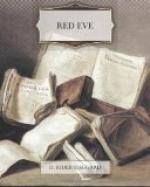“A good shot enough,” grumbled Grey Dick. “Still, it is a shame to slay nags of such a breed and let the rogues who ride them go.”
But his companions only stared at him almost in awe, while the other Clavering men rode on. Before they had covered fifty paces, again the great bow twanged, and again a horse was seen to rear itself up, shaking the rider from its back, and then plunge away to die. Now Hugh’s serving-men also lifted their bows, but Grey Dick hissed:
“Leave them to me! This is fine work, and you’d muddle it!”
Ere the words had ceased to echo another horse was down.
Then, as those who remained still came on, urged by the knight who ran shouting behind them, all loosed, and though some arrows went wide, the end of it was that ere they reached the little mound every Clavering horse was dead or sore wounded, while on the heath stood or lay seven helpless men.
“Now,” said Grey Dick, “let us go and talk with these foot-soldiers.”
So they went out, all of them, except he who had the horses, and Hugh called aloud that the first man of the Claverings who lifted a bow or drew a sword should die without mercy. And he pointed to Grey Dick, who stood beside him, arrow on string.
The Claverings began to talk together excitedly.
“Throw down your weapons!” commanded Hugh.
Still they hesitated. Then, without further warning Dick sent an artful arrow through the cap of one of them, lifting it from his head, and instantly set another shaft to his string. After this, down went the swords and bows.
“Daggers and knives, too, if it please you, masters!”
Then these followed.
Now Hugh spoke a word to his men, who, going to the dead and dying horses, took from them the stirrup-leathers and bridle-reins and therewith bound the Claverings back to back. But the French knight, in acknowledgment of his rank, they trussed up by himself, having first relieved him of his purse by way of fine. As it chanced, however, Hugh turned and saw them in the act.
“God’s truth! Would you make common thieves of us?” he said angrily. “Their weapons and harness are ours by right of war, but I’ll hunt the man who steals their money out of my company.”
So the purse was restored. When it was safe in the knight’s pouch again Hugh saluted him, begging his pardon that it should have been touched.
“But how are you named, sir?” he added.
“Sir Pierre de la Roche is my name,” replied the knight sadly, and in French.
“Then, Sir Pierre de la Roche,” said Hugh, “here you and your people must bide until some come to set you free, which, as this place is lonely and little crossed in winter, may be to-day or may be to-morrow. When at length you get back to Blythburgh Manor, however, or to Dunwich town, I trust it to your honour to declare that Hugh de Cressi has dealt well with you. For whereas he might have slain you every one, as you would have slain him and his if you could, he has harmed no hair of your heads. As for your horses, these, to his sorrow, he was obliged to kill lest they should be used to ride him down. Will you do this of your courtesy?”




